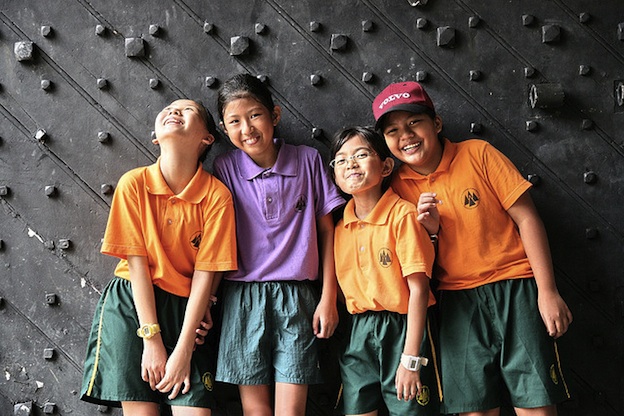SingaporeMotherhood | Parenting
December 2014
Preparing and Supporting Your Child in Primary School

Entering primary school is a milestone for many children. It marks the beginning of their formal education and can be a huge leap from the more relaxed setting of a kindergarten or pre-school. For some children, this change can be scary, especially on their first day in a big school building surrounded by unfamiliar faces.
What can you, as a parent, do to reduce the level of anxiety and stress for your child, and make it a pleasant and happy experience?
[banner][/banner]
A Sneak Preview of School
It starts simply with preparing children for their first day at school – and familiarisation is one of the best forms of preparation. How about bringing your child to visit the new school before the school year kicks off? You could take pictures of the different areas of the school – such as the classrooms, canteen and playground – and show them to your child later on to help him to get more acquainted with the different facilities.
It would also be good to talk to your child about school routines such as the flag-raising and flag- lowering ceremonies, recess and assembly. If the child’s grandparent or domestic helper is the caregiver, you might also like to familiarise them with the school environment and certain routines, such as the school bus schedule and pick-up and drop-off points.
Getting Used to Student Life
A simple way to get your child excited about school is to rope him in when it comes to purchasing school uniforms and shoes. It’s also a good opportunity to explain why there are rules about school attire. For a more fun approach, let your child have a say in choosing the schoolbag and stationery – that’ll let him exercise some personal taste and imagination!
Children also need to have some “schooling skills” such as buying things in the school canteen or bookshop, asking for permission and help, organising their schoolbag and even passing messages between school and parents. So look out for opportunities when your child can practise some of these skills at home or even with his playmates. The more you can demystify school life, the easier the adjustment your child will have.
Handling Schoolwork
If kindergarten, with a focus on play and social activities, is regarded as “child’s play”, then primary education might strike some as “serious work”. Children have to learn to manage homework and cope with tests and exams. Support from parents is absolutely critical at this stage.
For a start, encourage your child to talk about his new experiences and what he likes and doesn’t like about school. Listen for any worries he might have and attend to those concerns. It’s easy as adults for us to brush aside what seem to be small matters, but it’s helpful to learn to see things through his eyes. You might even want to take a couple of days off from work to help your child settle into school and the new routine.
As your child adapts to school life, show your support in other ways, such as valuing him for who he is, and not what he has achieved. Instead of comparing his performance with others or expressing disappointment when he is not performing up to your standard, appreciate his efforts. Focus on the learning process – not only on the marks!
Also take the chance to find out if your child might be encountering difficulties in his studies. Together, parents and child can set achievable goals and realistic expectations, so that everything doesn’t seem so daunting. Most importantly, reassure him of your love and care, regardless of his results.
Knowing your child – his weaknesses, strengths, and talent – is also a form of support. Take time to discover your child’s strengths and talents, instead of focusing on his weaknesses. As a child begins to develop his potential, his sense of confidence will grow too.
Supporting your child can also be through the guidance you give. Young children benefit from having a healthy routine for school and homework, including having a conducive learning environment and clear rules about TV and play time. It helps them to gradually develop self- discipline. Other caregivers, be they grandparents or a domestic helper, should keep to the routine and rules too. Where necessary, discipline your child but do so with empathy and let him know what he has done wrong.
Settling In
Beyond what parents can do, schools also form part of the support system to help children adapt to primary education. Schools have orientation programmes and buddy systems for Primary 1 pupils, to ease them into school life. They also have specialist staff such as pastoral care coordinators, learning support coordinators and teacher counsellors to attend to the children’s needs.
Find out more about how you can get involved with your child’s school. Many schools have Parent Support Groups, with a variety of activities to help parents and students at different stages of their child’s education.
Entering primary school is a big step for young children, and one that they will hopefully look back on fondly when they’re older. With the right support from parents and schools, they will be able to adapt effectively and build a strong foundation for the rest of their education.
This article is reproduced with permission from the Ministry of Education, Singapore. Go to Schoolbag.sg for more education news and features.
Main photo: Ministry of Education, Singapore Government
All content from this article, including images, cannot be reproduced without credits or written permission from SingaporeMotherhood.
Follow us on Facebook, Instagram, and Telegram for the latest article and promotion updates.






